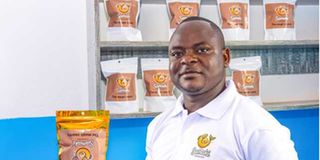
Francis Thoya (left) and his chef, Kazungu Ngumbao, show some of their products on January 5, 2025, in Kilifi.
When the Covid-19 pandemic struck, Francis Thoya's world was upended. With public gatherings banned, his event planning business came to a halt, leaving him without an income.
To adapt, he began selling dried shark meat, believing it was a practical choice during the lockdown due to its long shelf life. He thought people could stockpile it during the restrictions, however, the business soon faced challenges. The supply of the meat dwindled due to overfishing, and he was forced to abandon the venture.
Additionally, the overpowering smell of the meat put off potential customers. This challenging period, however, sparked a breakthrough that would ultimately benefit him and his community.
“That was when I discovered a pressing issue in Kilifi County: high malnutrition rates, particularly among pregnant women and children under five. Determined to make a difference, I set out to create an affordable, nutritious snack using local ingredients like fish, cassava, nuts, and fruits,” he says.
Thoya began exploring ways to address malnutrition using the accessible resources in his area. He researched the health benefits of fruit and cassava and consulted with specialists and nutritionists. After experimenting with a baked combination of all three ingredients, he eventually settled on a cookie as the ideal solution, something that would be palatable to both children and adults.
He founded Samaki Cookies, a simple, affordable snack designed to provide maximum nutrition with minimal ingredients. Despite his background in Sociology and event planning, which were unrelated to food production, his entrepreneurial mindset pushed him to explore this new path.

Francis Thoya, pictured in his production facility in Kilifi on January 5, 2025, is the founder of Samaki Cookies, an affordable snack designed to combat malnutrition using locally available resources.
“Now, as the delicious aroma of baking fish cookies fills the air in my small factory, I am proud of what we have built. For me, it is not just a business but creating something healthy, affordable, and truly impactful for the people who need it most,” he says.
Samaki Cookies are nutrient-dense treats made from fish powder, cassava flour, and fruit. Fish provides essential protein and omega-3 fatty acids, cassava offers energy, and fruits contribute vitamins and natural sweetness. He says he chose these ingredients because they are locally available, affordable, and highly nutritious.
“With the significant malnutrition challenges, I identified a gap in accessible, nutrient-rich foods that could easily be incorporated into daily diets. Many families rely on starchy meals with limited protein, which impacts child development. We set out to offer a balanced, tasty, and cost-effective solution,” he notes.
Thoya sources fresh fish from local fishermen, which is then cleaned, dried, and ground into a fine powder. This fish powder is carefully combined with cassava flour, a staple crop in Kilifi County, to create a nutritious base. To enhance both flavour and nutrition, fruits such as pineapples, mangoes, and bananas are either dried and powdered or processed into a puree.
“We combine the fish, cassava, and fruits in precise proportions. A small amount of water and butter binds the mixture together, with occasional icing sugar added for sweetness,” he explains.
The dough is then shaped into cookies and baked at a controlled temperature, ensuring they achieve the perfect crunch while preserving their nutritional value.
Following the baking process, each batch undergoes rigorous internal quality checks to maintain consistency in taste, texture, and nutritional content. Once cooled, the cookies are packaged in airtight containers to preserve their freshness and extend their shelf life, making them ready for sale.

Francis Thoya (left) and his chef, Kazungu Ngumbao, during the production of Samaki Cookies, photographed on January 5, 2025, in Kilifi.
“We currently employ three full-time workers and three part-time workers in production, packaging, and sales. Additionally, the company supports over 20 local farmers and fishermen by sourcing ingredients directly from them,” he says adding that through these collaborations, they promote a sustainable value chain.
Cassava and fruits are sourced from small-scale farmers, providing them with a steady income and supporting their economic empowerment. Local fishermen benefit from a reliable market for their catch, which boosts their revenue and helps reduce waste.
Early sales revenue was reinvested into improving production and scaling operations. The company has also benefited from partnerships with local institutions such as Farm Africa and Pwani University, which have been instrumental in testing and validating the nutritional benefits of the product.
Their research has provided valuable insights into improving the formulation and production techniques, confirming that the product is a viable solution to a significant challenge.
Starting with an initial investment of Sh150,000 from personal savings and contribution from PLAN International, Thoya is now seeking further grants and investors to scale his operations.
Early on, product development posed a significant challenge, requiring months of trial and error to achieve the right balance of taste and nutrition.
Consumer acceptance also proved difficult, as many were unfamiliar with fish-based cookies. To address this, the company focused on educating the community about the product's benefits.
“Funding for scaling production has been a persistent challenge from the start, however, I have been fortunate to receive invaluable support from friends, family, and well-wishers. While there is still much to be done, this support has been instrumental in allowing the business to grow,” he says.
Initially, the company sold only 10 packs per week, but demand has since surged to 1,000 packs weekly. He notes that the cookies are priced affordably to ensure accessibility while maintaining high quality.
A standard pack of Samaki Cookies is priced between Sh50 and Sh100, depending on the quantity and packaging. Currently, the company focuses on Samaki Biscuits, but plans are underway to expand the product line to include Samaki Cookies (Original Recipe), available in various pack sizes, and CocoseaBites, a high-protein snack in development targeting under 5 and expectant mothers.
Cassava-based cereal mix, fortified porridge flour, is being planned as a future product. The company sells directly to consumers through local markets, community health centres, and small retail shops in Kilifi, and is in discussions with supermarkets and schools for broader distribution.
Their goal is to partner with NGOs and government programs to integrate Samaki Cookies into food relief and nutrition initiatives.
The company prioritises affordability while ensuring fair compensation for farmers, fishermen, and production workers. The pricing structure accounts for ingredient costs, production expenses, and transportation, all while remaining competitive in the local market.
While Samaki Cookies remains a cottage industry for now, Thoya has ambitious plans for the future. He aims to increase production, forge partnerships with nearby educational institutions and medical facilities, and expand distribution beyond Kilifi County.
He also plans to broaden the company’s reach by introducing new flavours, increasing production capacity, and forming partnerships with schools, health institutions, and NGOs to serve vulnerable populations. He emphasised the importance of scaling sustainably, maintaining local ingredient sourcing, and ensuring fair wages for workers.
The company’s long-term goals include expanding distribution, enhancing nutritional education, and exploring eco-friendly packaging solutions.
Thoya sees his business as a model for addressing malnutrition, not only within his County, but across Kenya and beyond. With the right support, he believes they can establish a larger facility and expand distribution to more regions.









